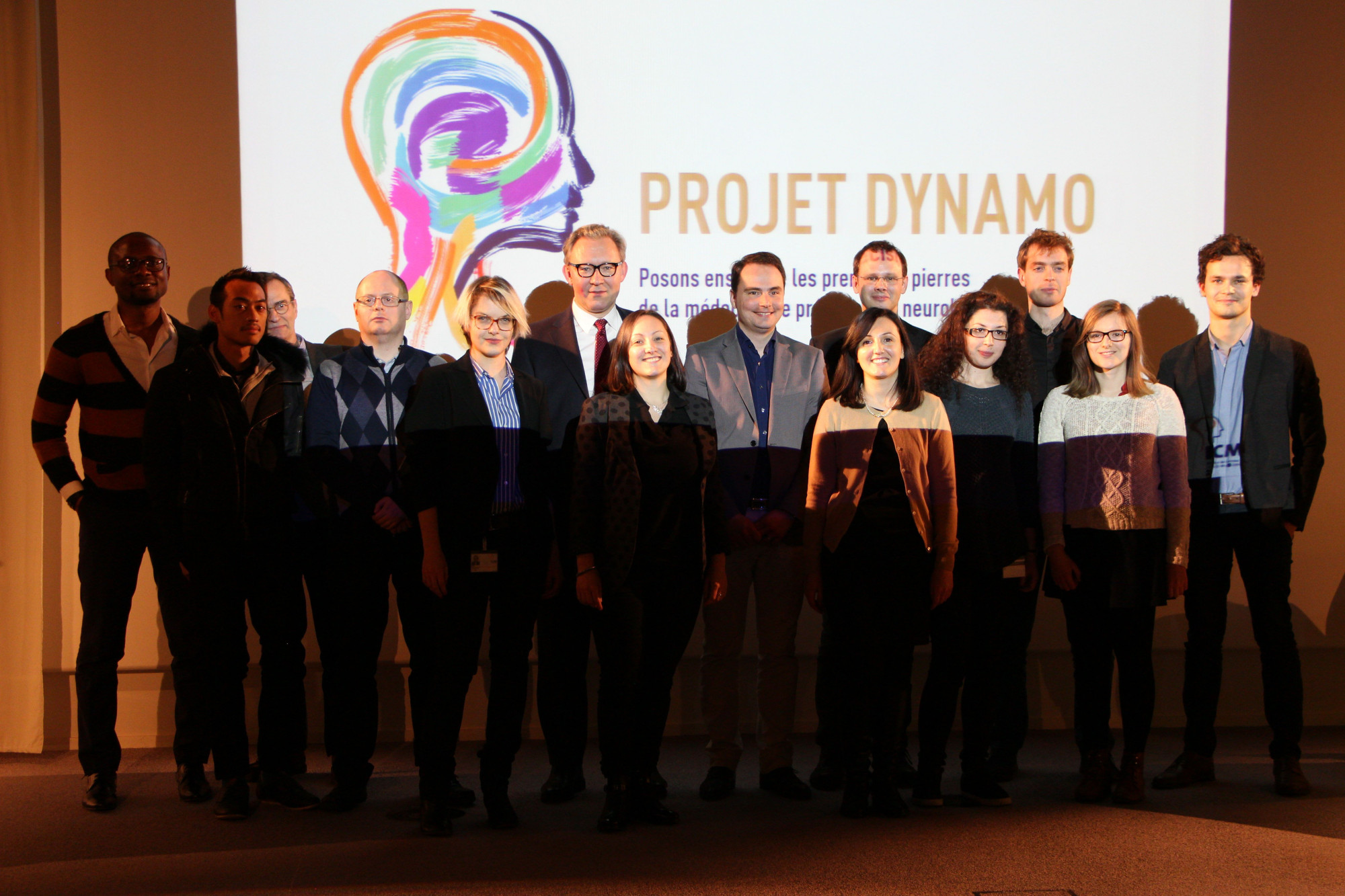Mental Health & Neurology
Alzheimer's Disease, Dementia & Neurodegenerative Diseases
AXA Chairs
France
2013.08.31
AXA-Sorbonne Université Chair on Alzheimer’s disease
The recently evidenced existence of a decade-long silent stage of the disease, with no clinical symptoms expressed, yet biological markers observable, creates opportunities for improving and accelerating early detection. To meet the need for diagnosis of Alzheimer’s from the beginning, the AXA - Sorbonne Université Chair on Alzheimer’s has been created with the aim of developing and validating new biomarkers to increase diagnostic accuracy at the totally asymptomatic stage and to better assess drug efficacy. Hosted by the highly specialized Institute for Memory and Alzheimer’s Disease (IM2A) using the latest cutting-edge genetic, biochemical and neuroimaging technology available, the Chair will utilize the combined resources of several first-class scientific research teams in a rich variety of related research fields—from cognition to neuroimaging to genetics—working from bench to bedside. It will use quality and exhaustive cohorts of patients from all disease stages, managed through the IM2A infrastructure, which is a national reference center for several Alzheimer’s and neurodegeneration-related clinical research programs and a leading institution worldwide. It will also benefit from a unique platform for integrating and processing multimodal biomarker information in order to extract specific algorithms for early presymptomatic detection.
The Chair and full university professorship will be permanently held by Prof. Harald Hampel, who is a word-leading researcher with vast expertise and reputation in neurology, psychiatry and cutting-edge neuroscience research. With 20 years of experience, he has successfully developed international research programs dedicated to Alzheimer’s diagnosis and therapeutic algorithms.
Hampel's findings will provide significant new understanding of Alzheimer’s Disease and related disorders, while building upon the scientific capabilities of biostatistical modeling, leading to breakthrough advances in improving both diagnosis and treatment using innovative biological markers.
Voicing Out the Silent Markers of Alzheimer’s
Anticipate Alzheimer Disease finding new biomarkers for an earlier diagnosis and therapy
One fact we can hardly forget is that Alzheimer’s disease represents one of the greatest and most significant risks for the growing population of elderly individuals and their families. With around 26 million people affected in the world, and an estimated 2 million in France only by 2020, Alzheimer is the most frequent neurodegenerative disease that will increase dramatically over the next decades to an estimated number of 120-200 Mio patients presenting a major worldwide epidemic. Therefore, it presents a fundamental global challenge, with increasing strain on health care systems and our societies.
The recently evidenced existence of a silent stage of the disease, with no clinical symptoms expressed, yet biological markers observable, creates opportunities for improving and accelerating diagnostics. The reasonable hope of treatment in a near future urges the need for enabling diagnoses of Alzheimer at a totally asymptomatic stage, particularly for individuals nearing conversion state – when Alzheimer’s effects will become evident.
The AXA UPMC Chair on Alzheimer will be hosted in the highly specialized Institute for Memory and Alzheimer’s Disease (IM2A) using the latest genetic, biochemistry and neuroimaging technology advances available at the UPMC and the Salpêtrière Hospital campus.
It will aim at validating new biomarkers to increase diagnostic accuracy at the totally asymptomatic stage, and allow to better assess drug efficacy.
To do so, the Chair will rely on the unique combination of resources of several first class scientific research teams in the variety of related fields – from cognition to neuroimaging to genetics. It will use quality and exhaustive cohorts of patients - from all disease stages-, managed through the highly specialized IM2A infrastructure that is national reference center of several Alzheimer and neurodegeneration related clinical research programs and a leading institution in France, Europe and worldwide. It will also benefit from a unique platform to integrate and process multimodal information – taking into consideration the variety of markers & data characteristics-, to extract specific algorithm for early pre symptomatic diagnostic.
The Chair will be permanently held by Prof. Harald Hampel, who benefits worldwide experience and reputation in neurology, adult and psychiatry of later life and neuroscience research, with more than 15 years of experience in transdisciplinary and translational international research programs dedicated to Alzheimer’s diagnostic and therapeutic algorithms.
With the AXA endowment, University Pierre et Marie Curie, the first French University in Science & Medicine and a global leading in the field of brain research, will provide new significant insights on Alzheimer’s Disease, related dementia disorders and neurodegenerative diseases, while building upon the scientific capabilities of statistical modeling, potentially leading to essential advances in diagnosis and treatment using innovative biological markers Prof. Harald Hampel is currently the scientific coordinator of the Institut Hospitalo Universitaire (IHU) and industry funded French flagship research program INSIGHT (INveStIGation of AlzHeimer’s PredicTors in Subjective Memory Complainers) that is currently ongoing at the IM2A, Hôpital de la Salpêtrière and the Institut du Cerveau et de la Moelle (ICM). The major goal is to indentify and validate biomarkers, genetic risk factors and neuroimaging methods in at risk subjects for Alzheimer’s disease before the onset of clinical symptoms.
Prof. Hampel and his multi-disciplinary research team in Paris endeavours to characterize the full disease “roadmap” in the brains of living people with all available biological indicators to provide effective early solutions for diagnosis and therapy for affected patients.
Biosketch Professeur Harald Hampel, MD, PhD, MA, MSc
After a post-doctoral fellowship at the National Institute of Health, Bethesda, he became professor of psychiatry and founding director of the Alzheimer Memorial Center at Munich University before being appointed professor and chair of psychiatry at Trinity College, Dublin. In 2010 he was appointed as professor & chair of psychiatry at the University of Frankfurt and in 2013 as professor and AXA Research Fund Chair at Pierre and Marie Curie University, Départment de Neurologie, Institut de la Mémoire et de la Maladie d’Alzheimer, Hôpital de la Salpêtrière, Paris. He published more than 500 peer-reviewed research papers and edited 8 books, won multiple awards for his research focusing on brain health & disease, biomarker and therapy discovery in Alzheimer's disease. He holds international research grants and is principal investigator of research consortia. He is senior Associate Editor of the journal of the Alzheimer Association Alzheimer's & Dementia.

Pr Harald Hampel & his research team on the Dynamo research project
To add or modify information on this page, please contact us at the following address: community.research@axa.com

Harald
HAMPEL
Institution
Sorbonne University
Country
France
Nationality
German
Related articles
Mental Health & Neurology
Pandemics & Infectious Diseases
Women's Health
Covid-19
Mental Disorders, Anxiety & Depression
Pregnancy & Maternal Health
Neurodevelopmental Disorders
AXA Award
Spain
2020.08.31
The Effects of the COVID-19 Pandemic on the Mental Health of Mothers and Newborns
Early results are expected in less than 12 months and will help bridge a critical gap in research. Indeed, “in... Read more

Maria
FORASTER
ISGlobal Barcelona Institute for Global Health
Mental Health & Neurology
Pandemics & Infectious Diseases
Mental Disorders, Anxiety & Depression
Covid-19
AXA Award
Spain
2020.08.31
Coping With the Pandemics: What Works Best to Reduce Anxiety & Depression
The results of this longitudinal study will allow Dr. Radua to produce evidence-based, clear, and specific recommendations on effective coping... Read more

Joaquim
RADUA
